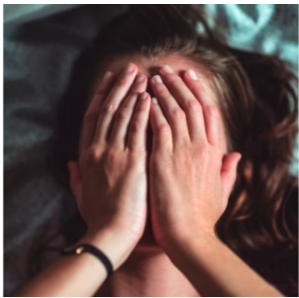The Guilt That Women Suffer
Women struggle mightily with the emotion of guilt. I’ve observed this truth for nearly 30 years as a psychotherapist, friend, mother, employer, neighbor, and in every other role I play with fellow women. When it comes to emotional well-being, guilt may be the greatest obstacle we face. Men struggle with guilt, too — it’s a human emotion — but this post isn’t about men. It’s also not about guilt in a universal sense, as it relates to original sin. It’s about women and our habit of feeling guilty for pretty much everything. What I see in my office day in and day out is this: women believe that everything that’s “wrong” has ever been “wrong” and will ever go “wrong” is their fault. If something or someone else isn’t okay, we’ve done something to cause it and are thereby responsible for fixing it. At the same time, women feel guilty for needing anything for themselves. The truth is women feel guilty most of the time, for most everything. Guilty is just our normal state. In trying to understand why this is, let’s take a step back. From a neurological standpoint, females tend to be more relationally wired than males. This isn’t always the case of course, but in general, the studies support that females are biologically designed to be attuned to other people’s experiences, to feel their pain, perhaps to be able to care for their offspring. If we look to science to understand women’s propensity for guilt, we might consider that females come into this world with neurochemicals that stimulate nurturing, bonding, and empathy. But our empathic wiring isn’t the problem. Rather, the porblem is that we turn this beautiful quality of empathy, with which we’re gifted, into the self-destructive habit called guilt. In essence, our natural attunement to other people’s experiences becomes something we use against ourselves; we’re bad if we fail to protect everyone else from suffering, or put another way, fail to keep everyone else happy. Our capacity for kindness and connection transmutes into an unkindness we harness against ourselves. At the same time, through our cultural conditioning, we’ve learned we can best achieve emotional safety and belonging by being likable. And so, we spend a lot of energy trying to be pleasing, which, if you’re female, means keeping other people happy. When other people aren’t happy, when others perceive something as “wrong,” it means that we have failed. We’re then in danger of being rejected and criticized, thereby losing our place of belonging. Taking the blame for other people’s experiences becomes an emotional survival strategy. It keeps us likable. So too, we assume everything is our fault to maintain control. If we’re to blame for everything and we’re who broke whatever’s broken, then we can also fix it. We can do better, be better—and we will, which will make everything okay. But what if we can’t make everything okay by fixing ourselves What if things can go wrong for reasons we can’t know? What if everything isn’t our fault? That would mean that life isn’t entirely in our control. It would mean that life happens on life’s terms, not ours. It would mean that we’re not the (negative) center of the universe. For many, this is a scary idea. We avoid recognizing that things just happen for infinite reasons–even if it means living in constant guilt and self-judgment–rather than face the fact that much of life isn’t in our control or even about us. Paradoxically, guilt is also a way of keeping us from having to feel what we feel. When something isn’t working in our lives, focusing on all the reasons we’re to blame–and what’s wrong with us–keeps us from experiencing the feelings related to what’s happening. While feeling responsible and guilty is painful, it successfully avoids the pain that might be properly associated with the situation. And so, we stay stuck in the rumination and negative looping about our brokenness, but we don’t process the feelings that would help us move forward. But perhaps most importantly, when we get caught in guilt and self-attack, ruminating on our guilt, we abandon the possibility of purposefully addressing what isn’t working. We get waylaid in the familiar and comfortably uncomfortable narrative of our failings. We’re then distracted from the most important question: how to improve what isn’t working. We surrender the chance to chart a course forward. We’re stuck in the old guilt and shame muck, and we end up with the same old question we always end up with: “What’s wrong with me?” It’s a question we know all too well. So, how do you break the cycle and change your inner narrative? First, you didn’t learn to be guilty overnight and you won’t break the habit overnight either. But as with everything, freedom begins with awareness. You start by noticing, in small ways, your propensity to blame yourself, the ways you personally dive into the guilty rabbit hole. And, when you notice yourself falling, you start catching yourself in mid-dive or may

Women struggle mightily with the emotion of guilt. I’ve observed this truth for nearly 30 years as a psychotherapist, friend, mother, employer, neighbor, and in every other role I play with fellow women. When it comes to emotional well-being, guilt may be the greatest obstacle we face.
Men struggle with guilt, too — it’s a human emotion — but this post isn’t about men. It’s also not about guilt in a universal sense, as it relates to original sin. It’s about women and our habit of feeling guilty for pretty much everything.
What I see in my office day in and day out is this: women believe that everything that’s “wrong” has ever been “wrong” and will ever go “wrong” is their fault. If something or someone else isn’t okay, we’ve done something to cause it and are thereby responsible for fixing it. At the same time, women feel guilty for needing anything for themselves. The truth is women feel guilty most of the time, for most everything. Guilty is just our normal state.
In trying to understand why this is, let’s take a step back. From a neurological standpoint, females tend to be more relationally wired than males. This isn’t always the case of course, but in general, the studies support that females are biologically designed to be attuned to other people’s experiences, to feel their pain, perhaps to be able to care for their offspring. If we look to science to understand women’s propensity for guilt, we might consider that females come into this world with neurochemicals that stimulate nurturing, bonding, and empathy. But our empathic wiring isn’t the problem. Rather, the porblem is that we turn this beautiful quality of empathy, with which we’re gifted, into the self-destructive habit called guilt. In essence, our natural attunement to other people’s experiences becomes something we use against ourselves; we’re bad if we fail to protect everyone else from suffering, or put another way, fail to keep everyone else happy. Our capacity for kindness and connection transmutes into an unkindness we harness against ourselves.
At the same time, through our cultural conditioning, we’ve learned we can best achieve emotional safety and belonging by being likable. And so, we spend a lot of energy trying to be pleasing, which, if you’re female, means keeping other people happy.
When other people aren’t happy, when others perceive something as “wrong,” it means that we have failed. We’re then in danger of being rejected and criticized, thereby losing our place of belonging. Taking the blame for other people’s experiences becomes an emotional survival strategy. It keeps us likable.
So too, we assume everything is our fault to maintain control. If we’re to blame for everything and we’re who broke whatever’s broken, then we can also fix it. We can do better, be better—and we will, which will make everything okay.
But what if we can’t make everything okay by fixing ourselves What if things can go wrong for reasons we can’t know? What if everything isn’t our fault? That would mean that life isn’t entirely in our control. It would mean that life happens on life’s terms, not ours. It would mean that we’re not the (negative) center of the universe.
For many, this is a scary idea. We avoid recognizing that things just happen for infinite reasons–even if it means living in constant guilt and self-judgment–rather than face the fact that much of life isn’t in our control or even about us.
Paradoxically, guilt is also a way of keeping us from having to feel what we feel. When something isn’t working in our lives, focusing on all the reasons we’re to blame–and what’s wrong with us–keeps us from experiencing the feelings related to what’s happening. While feeling responsible and guilty is painful, it successfully avoids the pain that might be properly associated with the situation. And so, we stay stuck in the rumination and negative looping about our brokenness, but we don’t process the feelings that would help us move forward.
But perhaps most importantly, when we get caught in guilt and self-attack, ruminating on our guilt, we abandon the possibility of purposefully addressing what isn’t working. We get waylaid in the familiar and comfortably uncomfortable narrative of our failings. We’re then distracted from the most important question: how to improve what isn’t working. We surrender the chance to chart a course forward. We’re stuck in the old guilt and shame muck, and we end up with the same old question we always end up with: “What’s wrong with me?” It’s a question we know all too well.
So, how do you break the cycle and change your inner narrative?
First, you didn’t learn to be guilty overnight and you won’t break the habit overnight either. But as with everything, freedom begins with awareness. You start by noticing, in small ways, your propensity to blame yourself, the ways you personally dive into the guilty rabbit hole. And, when you notice yourself falling, you start catching yourself in mid-dive or may even pre-dive.
If your 11-year-old tells you she’s sad because she has no friends, maybe you notice that you immediately start figuring out how you’re a bad mother, and haven’t modeled good enough social skills, and all the reasons why you’re to blame for turning her into a social outcast.
As soon as you notice that you’re turning against yourself and diving into the self-blame hole, stop and do something different: Offer yourself kindness instead of criticism. Try a new path. Instead of going down into the old, stagnant, guilty rabbit hole, treat yourself differently.
How to Make Different Choices
If any of this sounds a little too familiar, you can try this two-part process:
Step 1: Feel how the situation feels. Feel the situation, not how it feels to be the cause of it. For example, how do you feel knowing your daughter is sad because she lacks friends? Simultaneously, notice if your feelings toward your daughter (or whatever situation) change when you aren’t guilty of having caused it.
Step 2: Turn your attention to now. What can you do to improve the situation that’s not working? In this example, how can you improve your daughter’s relationship with other kids? Turn your focus from what’s wrong with you to the present moment and how you can create positive change.
When guilt becomes a habit, it causes suffering and stagnation. But guilt is a habit we can break; we don’t have to feel guilty all the time. We don’t have to throw ourselves under the bus when something is wrong. Things can be wrong without our being to blame, or responsible for having caused it, or having to fix it. As revolutionary as it might sound, things can just be “wrong” without us being wrong. But for the guilt habit to change, we must choose to create a different internal dialogue and attitude towards ourselves. So, make that choice; make that change, and pay attention to who you are and who you become when you stop telling yourself that you’re broken!












